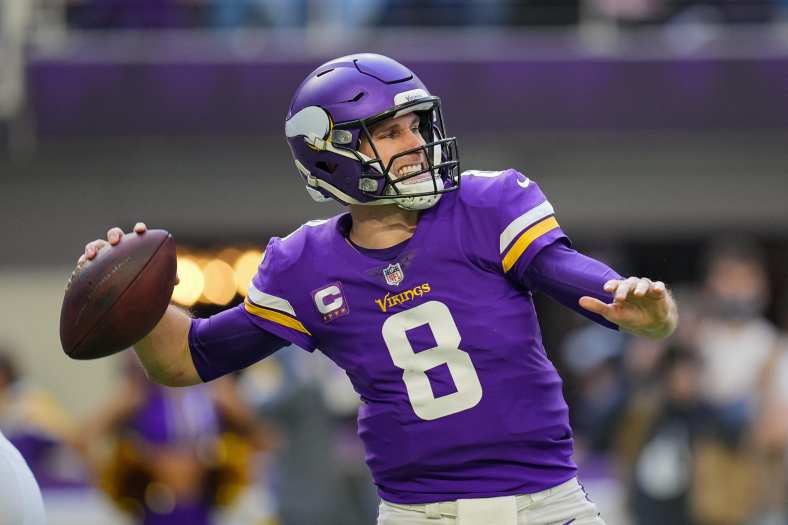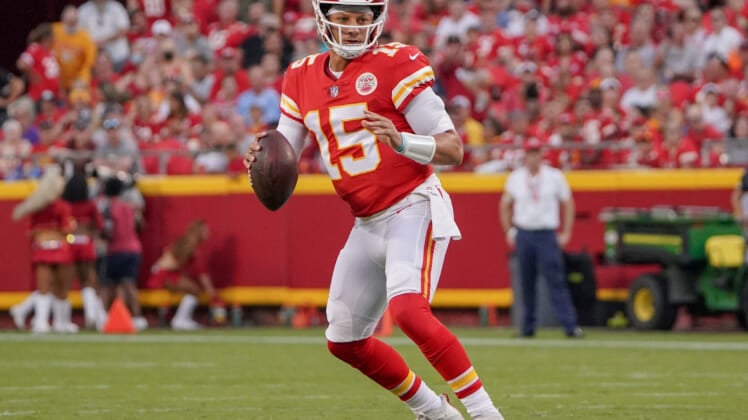
This Minnesota Vikings fan blog entry was originally posted at Purple Pain Forums by whoskmoon.
Never before in the history of the NFL have teams gone to such great lengths to acquire or keep a great quarterback than they have this offseason. Aaron Rodgers got a massive contract unprecedented for a quarterback in his prime, let alone for a quarterback with realistically just a few good seasons left.
The Denver Broncos traded for Russell Wilson, giving up multiple firsts, seconds, and two starters. Then, and maybe the biggest surprise, the Cleveland Browns not only gave Deshaun Watson a huge contract but gave up three first-round picks just to do so.
Why are teams going to such great lengths to acquire great quarterbacks while good quarterbacks such as Matt Ryan and Kirk Cousins either get traded for a third-round draft pick, or reportedly don’t get any offers at all? Why is Baker Mayfield, a former number-one overall pick still available?
The answer to that is pretty obvious. Quarterbacks who are truly great make it easier to win games than quarterbacks who are merely good; and great quarterbacks win Super Bowls while good ones, on the rare occasion they have won them, get carried to victories.
That isn’t really debatable, but what is debatable is what exactly makes up a great quarterback and just how much of an impact does having that great quarterback have on a team? Is Josh Allen already great? Does Matthew Stafford’s Super Bowl win on the most-talented team in the NFL mean he is suddenly great now? Would having Patrick Mahomes as the Minnesota Vikings’ quarterback make them a playoff team even with a poor defense like they had in 2021? Most importantly to the Vikings, how close is Kirk Cousins to being in the “great” category?
Related: NFL QB Rankings: Check our top-20 quarterbacks, where does Kirk Cousins rank?
What makes a quarterback great? How close is Kirk Cousins?

To answer those questions, we need to take a look at what exactly a quarterback does to help his team win. One of the biggest ways they do this is to not only win the games where the defense holds the opponent to a low score, but when the defense has a bad game, they elevate the team around them and win anyway.
In today’s NFL, most quarterbacks win when their team is only giving up 15 points in a game, but very few are capable of winning when their defense is giving up 25 points a game. That 25+ point per game winning quarterback is what most teams are trying to get when they trade multiple firsts to move up in the draft or to acquire Wilson or Watson. It’s what the Packers want out of Rodgers as they pay him $50 million per year.
Does that quarterback really exist though? Obviously, no quarterback, regardless of how great, wins every game that his team gives up 25+ points, and none even exists that could win every game even if his team gave up fewer than 20 points every game. Are there quarterbacks who win a lot more in those 25+ point or 20+ point games though? The answer to that, is obviously, yes.
Below are the win percentages of all current starting qualifying quarterbacks (plus some that don’t qualify but who I wanted to include anyway) when their teams give up a very winnable amount of points. I slotted the win percentages into 0-15 points given up (games even Sam Darnold wins), 16-20 points given up and 21-25 points given up. Note that this list is missing some big names, but with stats like these, the larger the sample size the better. Kyler Murray, Justin Herbert, Tua Tagovailoa and Joe Burrow just haven’t started enough games.
Based on these numbers alone, and not yet looking at winning percentages when these quarterbacks are forced to score a lot to win games, it is easy to understand why Cleveland gave up the farm for Watson and why Green Bay didn’t want to let Rodgers go. They simply do not lose even when their defenses are just average. While most quarterbacks have winning records even in that 21-25 range, being .850 in games where a team gives up 21-25 points is a game or two better in a season than being just .600.
On the other hand, Wilson is worse than Derek Carr in games an average quarterback wins most of the time. He isn’t horrible here, but based on these numbers he doesn’t look like he was worth what Denver gave up for him. It also looks like the San Francisco 49ers would be foolish to not stick with Jimmy Garoppolo with how dominant he appears to be in these situations.
From the Minnesota Vikings’ standpoint, a one-year extension of $35 million doesn’t look too bad for a quarterback who is 9th in win percentage among qualifying quarterbacks when his team gives up 21-25 points. He’s not worth an extension of Rodgers’ caliber obviously, but this is not bad at all.
Related: 2022 NFL Power Rankings: See where the Minnesota Vikings rank
So those are the winnable games, what about the high-scoring ones?
I did not include 40+ scores because they don’t happen very much, and the vast majority of quarterbacks don’t have even one win in that situation. Sample size has skewed the results quite a bit for some of the quarterbacks without a lot of starts in an individual slot as well, and I tried to make a note of that when the numbers didn’t make a lot of sense (like with Garoppolo and Goff).
Once again, Mahomes continues to dominate all other quarterbacks. Based on his career average, he would have won 13 games even if his defense gave up what the league’s-worst Jets defense gave up on average in each game (29.6). Even Brady and Rodgers are barely above .500 in that slot. If Mahomes continues, he will be the unanimous GOAT by the time his career is over.
Rodgers also looks pretty good here, and the trade for Wilson looks much better, even if he doesn’t appear to be all that close to being the best quarterback in his division. Allen has a really good .500 win percentage in that first – and most important – slot after being somewhat disappointing in lower-scoring games.
Related: Minnesota Vikings: Analyzing their 2022 NFL Draft approach based on the Shanahan coaching tree
The most surprising quarterback in this list is Jared Goff, who was third-to-last in lower-scoring games but jumps up into the top five when a lot of points are needed to win. It is also interesting to note that Alex Smith, the proverbial game manager, has won a decent amount of high-scoring games, as well.
Cousins really disappoints in this list, and just barely beats out Darnold in being able to win high-scoring games. Watson and Wentz both have lower win percentages in games where their team gave up 26-30, but since their win percentage is as high or higher in 31-35 point games, that puts them over Cousins and Darnold.
Based on those numbers and those alone, here is a simple tier list ranking current starters:
For the most part, this matches up with nearly every other tier list out there, with a few exceptions. Having Goff and Garoppolo ahead of quarterbacks like Watson, Jackson and Stafford isn’t indicative as to what those quarterbacks actually contribute on the field.
Here is where I think we see the true impact of what playing in a super-talented offense can have on even an average quarterback. There is a lot more that goes into those win percentages than just the quarterback, and while he plays the biggest part in an offense being able to outscore the opponent, he is certainly not the only part.
It is pretty easy to identify those who have been blessed with great offenses for their entire career though, so I don’t think that invalidates these numbers. It is also easy to see where a guy like Allen, who has only been starting for four seasons and didn’t really come into his own until his third season, might be lower in those lists than he probably should be with how good he is now. Context still matters here, and it is important not to lose sight of that.
So those are the quarterback numbers and the tiers, but do they actually matter in getting to and winning in the playoffs, and should teams be spending what they are to get a great one? Of course they should.
Related: Minnesota Vikings mock draft: 2022 NFL Draft projections and analysis
How would other starting QBs have done with 2021 Minnesota Vikings?
For example, it doesn’t take a great football mind to know that the Minnesota Vikings’ defense was a problem last season and made it more difficult to win than the average defense. With the win percentages above, we can see what Rodgers, Mahomes, and Brady would have done if they were starting on this Vikings team even if the defense gave up the exact same number of points.
- Mahomes: 13 wins
- Rodgers: 10 wins
- Brady: 10 wins
- Prescott: 9 wins
- Wilson: 9 wins
- Ryan: 9 wins
- Stafford: 8 wins
- Cousins: 8 wins
- Tannehill: 9 wins
- Carr: 8 wins
One or two wins might not seem like a lot, but this past season for our Vikings, it was the difference between making the playoffs and watching from home. Once you get there – and scoring gets harder as officials stop calling defensive holding and defenses play with a lot more intensity – the ability to overcome adversity, and/or put up more points in a challenging spot, increases a team’s odds of winning dramatically. That is why teams covet great quarterbacks; whereas quarterbacks like Cousins who generally only win in a good situation, get very little interest.
If you enjoyed this piece, please consider hopping over to Purple Pain Forums and debating with other Minnesota Vikings fans about not only this topic, but so much more!